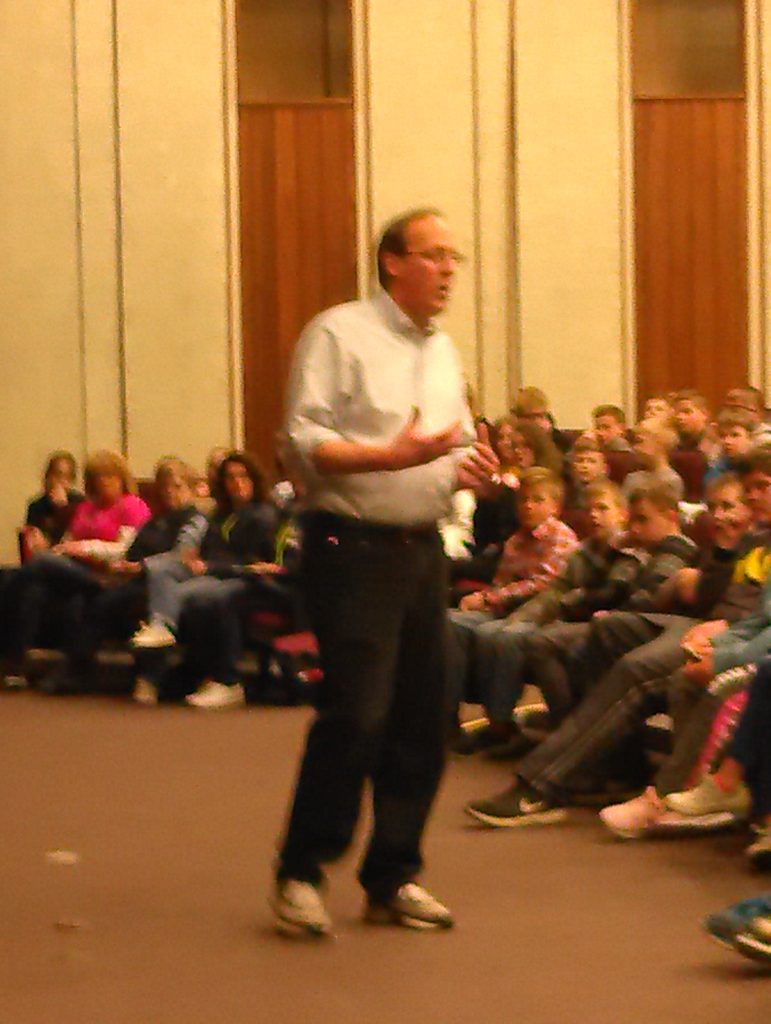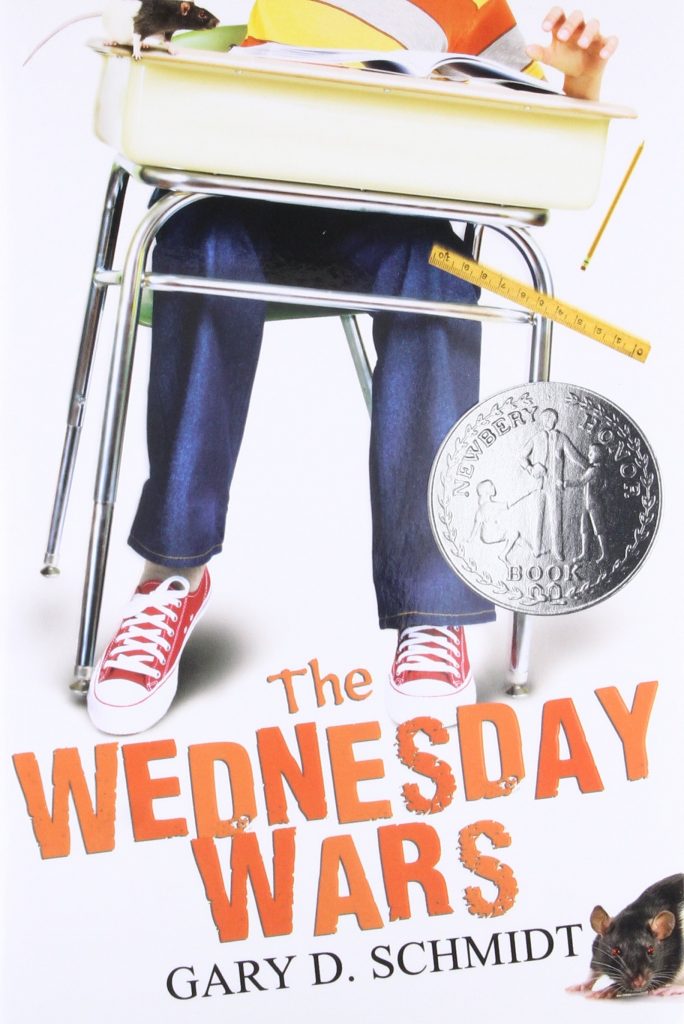One question every author gets, sometimes several times a day: Where do you get your ideas?
I had the happy opportunity to sit in on a presentation by Gary Schmidt and chat with him later, and while I didn’t ask the question, I got loads of material for an answer.

Speaking of questions: he began his presentation with the true story of creature-in-distress in San Francisco Bay. The distress call sent by a ship’s captain failed to mention the type of creature it was, so when three men from the Humane Society set out in their 8-foot rubber dinghy they were stunned to encounter a 40-foot whale! With determination, ingenuity, and lots of blood (their only equipment being knives) they managed to free the creature from the cables, fishhooks, and other detritus that bound it. Once released, the whale swam exuberantly away but then turned back. The three men, floating in the water, thought they were dead meat, but instead of attacking them the whale came back and gently touched each man on the chest with its snout.
The author told the story in an authorish way, with thrills and suspense and danger, all gleaned from a one-paragraph report in the local paper from five years ago. A straightforward little news item sparked all kinds of questions, such as, Was the whale’s gesture gratitude? If so, how did he learn it? And if so, how can we justify hunting whales?
The news item never become a novel (or not yet), but it illustrated his point that all great stories begin with questions.
Another long story, about the time he was in upstate Michigan in April (think snow and ice) attending a small librarians’ conference. At dinner, he was invited to accompany three of the librarians to a reluctant readers club meeting, currently in the middle of reading his book Trouble. At that hour of the evening, it was the last thing he wanted to do, but most children’s authors feel some responsibility to their readers, so he went.
Turned out, the “reluctant readers’ club” met in a medium security juvenile prison—behind eight steel doors, in a barren room with as many guards as there were teenage offenders. He met Joseph, who liked planets and whose favorite planet was Jupiter. He met Jake, who said he was a writer but nobody would ever read his work. “Send me your work, Jake,” said the award-winning author: “I’ll read it.” Jake never did, because shortly after the visit he was transferred to another prison, and nobody outside of family was allowed to know where.

As for Joseph, Gary Schmidt sent him a book about the planets and a poster of Jupiter, but the boy never received them because prisoners were not allowed to have personal items. The question: what would it feel like to be escorted into a cell at precisely 4:30 every afternoon and hear the steel door click shut behind you, locking you in until 6:30 the next morning?
That question, and many others, led to Orbiting Jupiter, with 14-year-old Joseph as a major character. Jake also, but his name is changed to Jack and he’s allowed to grow up under very different circumstances. We had our problems with Orbiting Jupiter, which seems very heavy for a novel marketed to middle grades, but it does fulfill the author’s second point: all great stories, besides beginning with questions, end with further questions. For Orbiting Jupiter: How else could such a story end?
Beyond questions, stories begin with pictures or scenes or actions. Driving home from a vacation with his six kids in the car, the author felt a simple scene spring into his head: a sixth-grader running behind eighth-graders in track practice. He’s faster, but intimidated by eighth-grade mightiness until a teacher on the sidelines yells, “What are you doing? Get ahead of them!” So he does. The teacher’s name? Mrs. Baker. He had to write down the scene before he forgot it, but there doesn’t seem to be a single piece of paper in the car except for the wrapper from a Milky Way bar. He wrote the scene on that, and that simple beginning becomes The Wednesday Wars.

So, there was a real Mrs. Baker, whose name he didn’t even bother to change. There was also real Holling Hoodhood and his name was Gary Schmidt. He was the kid left behind in Mrs. Baker’s sixth-grade class when everyone else left early on Wednesdays to go to Hebrew School or Catechism class. He was the one who cleaned out the closets and scraped the gum from under chairs and desks with a razor blade. And he was the one who had to read Macbeth when she plopped the complete works of William Shakespeare on his desk. That was only because the principal walked in one day and insisted young Gary had to do something educational, not janitorial work.
Mrs. Baker never discussed the plays with him, never asked questions, and never knew that young Gary ended up loving them. She was not, in fact, his favorite teacher. But Holling Hoodhood ended up feeling quite differently about his Mrs. Baker.
___________________________________________________
Another question: how do writers become writers? Gary Schmidt didn’t set out to be one, especially not a writer of fiction. Growing up in a conservative Baptist household had advantages, but one disadvantage was a certain narrowing of imagination and sense of what mattered in the world. The central doctrines of faith, certainly; but if God is the creator of all, then all creation matters. It took a while to realize that, especially in school because he was slow to read in the early grades. Though no one knew it at the time, he was color blind and found the words confusing. By second grade he was designated as a pumpkin (the slowest reading level, after green bean) but his second-grade teacher saw something in him worth developing, and spent the extra time needed to “save me as a reader.”
Literature opened the door to imagination for him (take a bow, Mr. Shakespeare), and became his special field—even his special writing field, with several academic works to his name. He still teaches at Calvin College in Grand Rapids, specializing in the 19th century. (Dickens and Darwin his favorite 19C authors, the later for his clear and lucid prose and the former for the way he constructed his plots, with inconsequential details that proved hugely consequential later in the story.)
But with children came children’s books. He and his wife started a collection for their own kids and saved those titles that could be read again and again. When he was asked to teach a children’s literature class he already had a structure in mind. But thinking further, and getting to know children’s authors, he felt an attraction not just to the books and the authors but to their mission.
“These are the future,” he says. Writing for children also opens up opportunities to speak to children, and that’s what he was doing in Warrensburg.
They’ll remember the stories—they may even remember the questions.
Support our writers and help keep Redeemed Reader ad-free by joining the Redeemed Reader Fellowship.
Stay Up to Date!
Get the information you need to make wise choices about books for your children and teens.
Our weekly newsletter includes our latest reviews, related links from around the web, a featured book list, book trivia, and more. We never sell your information. You may unsubscribe at any time.
We'd love to hear from you!
Our comments are now limited to our members (both Silver and Golden Key). Members, you just need to log in with your normal log-in credentials!
Not a member yet? You can join the Silver Key ($2.99/month) for a free 2-week trial. Cancel at any time. Find out more about membership here.
2 Comments
Leave a Comment
You must be logged in to post a comment.


[…] One question every author gets, sometimes several times a day: Where do you get your ideas? I had the happy opportunity to sit in on a presentation by Gary Schmidt and chat with him later, and while I didn’t ask the question, I got loads of material for an answer. Speaking of questions: he began his presentation with the true story of creature-in-distress in San Francisco Bay. The distress call sent by a ship’s captain failed to mention the type of creature it was, so when three men from the Humane Society set out in their 8-foot rubber dinghy they were stunned to encounter a 40-foot whale! Read more […]
I love Gary Schmidt. I am glad that he has chosen to write most of his books for the mainstream market. So many books by Christian publishers are only read by Christians.